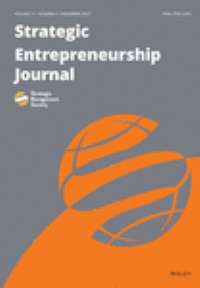Decision‐making in entrepreneurial teams with competing economic and noneconomic goals
IF 6.3
2区 管理学
Q1 BUSINESS
引用次数: 0
Abstract
Research SummaryHow should decision‐making be organized in entrepreneurial teams pursuing competing economic and noneconomic goals? Using a computational model, we examine how four archetypical decision‐making structures—unanimous approval, individual autonomy, majority voting, and lead entrepreneur—shape the performance of entrepreneurial firms when team members hold varied preferences for how to tradeoff economic and noneconomic goals. In stable environments, we find that majority voting generates highest economic performance, while unanimous approval generates highest noneconomic performance. Conversely, unanimous approval outperforms in fast‐changing contexts. Although goal diversity generally reduces economic performance, it enhances it in fast‐changing settings when teams operate under unanimous approval. This study thus underscores the critical role of decision‐making structures for the success of entrepreneurial teams.Managerial SummaryHow should entrepreneurial teams make decisions when balancing economic and noneconomic goals? We examine four decision‐making approaches—unanimous approval, individual autonomy, majority voting, and lead entrepreneur—and their impact on economic and noneconomic performance. In stable environments, majority voting leads to highest economic performance, while unanimous approval excels in achieving noneconomic goals. In fast‐paced environments, unanimous approval consistently delivers superior outcomes, enhancing both economic and noneconomic performance. Notably, teams with diverse goals can improve their economic performance in high‐velocity settings when using unanimous approval. These findings highlight the importance of choosing the right decision‐making structure to optimize performance in varying conditions. For entrepreneurial teams, adapting decision‐making processes to the pace of the environment is essential for success.具有竞争性经济和非经济目标的创业团队中的决策
在追求相互竞争的经济和非经济目标的创业团队中,应该如何组织决策?使用计算模型,我们研究了四种典型的决策结构——一致批准、个人自主、多数投票和领导企业家——当团队成员对如何权衡经济和非经济目标有不同的偏好时,如何塑造创业型公司的绩效。在稳定的环境中,我们发现多数投票产生最高的经济绩效,而一致批准产生最高的非经济绩效。相反,在快速变化的环境中,一致批准的效果更好。虽然目标多样性通常会降低经济绩效,但在快速变化的环境中,当团队在一致的批准下运作时,它会提高经济绩效。因此,这项研究强调了决策结构对创业团队成功的关键作用。当平衡经济和非经济目标时,创业团队应该如何做出决策?我们研究了四种决策方法——一致批准、个人自主、多数投票和领导企业家——以及它们对经济和非经济绩效的影响。在稳定的环境中,多数投票导致最高的经济绩效,而一致批准则有利于实现非经济目标。在快节奏的环境中,一致批准始终提供卓越的结果,提高经济和非经济绩效。值得注意的是,当使用一致批准时,具有不同目标的团队可以在高速环境中提高他们的经济绩效。这些发现强调了在不同条件下选择正确的决策结构以优化性能的重要性。对于创业团队来说,使决策过程适应环境的步伐是成功的关键。
本文章由计算机程序翻译,如有差异,请以英文原文为准。
求助全文
约1分钟内获得全文
求助全文
来源期刊

Strategic Entrepreneurship Journal
Multiple-
CiteScore
11.10
自引率
1.60%
发文量
31
期刊介绍:
The Strategic Entrepreneurship Journal is a research journal that publishes original work recommended by a developmental, double-blind review process conducted by peer scholars. Strategic entrepreneurship involves innovation and subsequent changes which add value to society and which change societal life in ways which have significant, sustainable, and durable consequences. The SEJ is international in scope and acknowledges theory- and evidence-based research conducted and/or applied in all regions of the world. It is devoted to content and quality standards based on scientific method, relevant theory, tested or testable propositions, and appropriate data and evidence, all replicable by others, and all representing original contributions. The SEJ values contributions which lead to improved practice of managing organizations as they deal with the entrepreneurial process involving imagination, insight, invention, and innovation and the inevitable changes and transformations that result and benefit society.
 求助内容:
求助内容: 应助结果提醒方式:
应助结果提醒方式:


